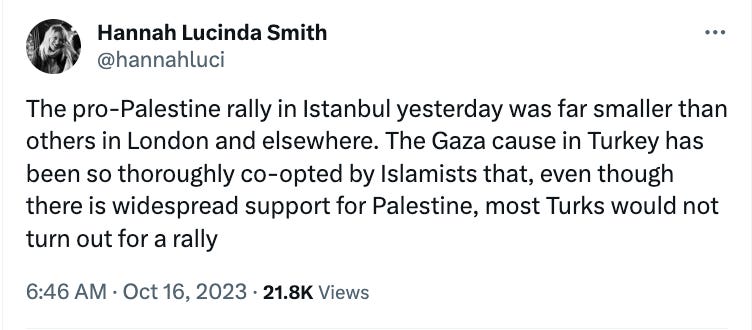Reading, Watching, Listening #10
Pro-Palestinian protests in Turkey, Western Muslims react, the Gaza war on Turkish TV
Hi folks,
Like many of you, I’ve been consumed by the news coming out of Israel-Palestine in the last ten days.
Below, I’ve put together some of the content in the Turkish-speaking or adjacent space you might find interesting. These include my reaction to reporting on the pro-Palestinian protests in Turkey, an Istanbul-based podcast by English-speaking Muslims, and some excerpts from Turkish TV coverage of the conflict.
Turkish public opinion on Israel-Palestine
This tweet from Hannah Lucinda Smith on Monday got my attention:
This is a useful way to think about Turkey’s orientation on the conflict. Why are the protests in London bigger than those in Istanbul or Ankara?
I think the protests in places like London, Paris and New York were extra big because the governments there expressed unconditional support for Israel, which didn’t represent public opinion. Progressives in the West were outraged because they felt like their politicians instantly rewinded to the 1990s or early 2000s, when criticism of Israel’s occupation (especially among left-leaning Jews) was still a fringe idea. They protested because they felt like their governments were tuning out their voices.
It’s different in Turkey because a) the regime has a clear stance that’s not up for discussion, b) because the public as a whole is already on the Palestinian side of the equation.
Let’s go through those.
a) Turkey is no longer a secular, Kemalist republic. The regime has changed in the last couple of decades (we can debate all day at what point exactly this happened, but I’d say the mid-2010s). The new regime is built on its own version of civilizational struggle against the West. It has an Islamist core, and the public knows that the people in charge care deeply about the Palestinian cause. A comparison with Iran is warranted in this sense: the only marches you see there are state-sponsored, and not that big. There was a march in Istanbul after Friday prayers, and that was government-organized and featured many big-whigs, including the presidential family. There are now demonstrations in front of the Israeli consulate, and the country is clearly getting more dangerous for Israeli citizens, but I don’t think we’ll see something on the scale of London.
b) In Turkey, there’s almost no political block that’s sympathetic to Israel on this conflict, just varying intensities of support for the Palestinian cause. Let’s very briefly go through the spectrum.
Support for the Palestinian cause is highest with Islamists (broadly defined), for obvious reasons.* It’s also pretty strong with the Turkish left, which is demographically small, but is prominent in the media and academia. Kemalists/core CHP supporters will condemn Israel’s occupation, and sometimes violent Palestinian actions, but they don’t really spend much time thinking about the conflict. The pan-Turkic nationalists have different hues to them. Currently, the MHP toes the government line, İYİ Parti condemns Hamas’ massacre and Israel’s apartheid regime, and Zafer Partisi refuses to express sympathy for the Palestinians, mostly out of anti-Arab sentiment. The Kurds have an Islamist-leftist split, supporting the Palestinians for different reasons. There are some nationalistic Kurds who refuse to shoulder the Palestinian cause, but they’re still a small group. There are some enthusiastically pro-Israel voices among Turkey’s dwindling stock of Jews, but they don’t have political weight.
So yes, as Smith writes in her tweet, the Palestinian cause has been co-opted by the state. This means that it loses an edge that it still has in Western capitals. I think it also means that there’s going to be plenty of room for Erdoğan to support the Palestinians and pressure the West, if he should choose to do so.
*For Islamists, supporting the Palestinians and supporting Hamas are becoming slightly different things. There are some Islamists who think that Hamas is tainted by its association with Iran.
Keep reading with a 7-day free trial
Subscribe to Kültürkampf to keep reading this post and get 7 days of free access to the full post archives.




